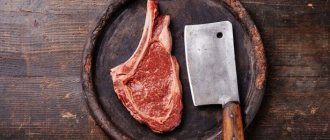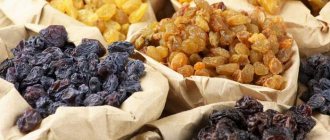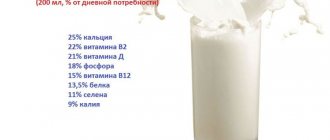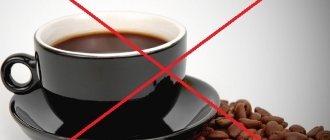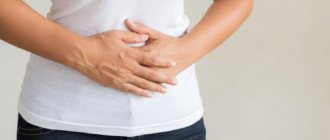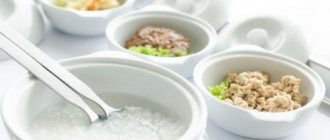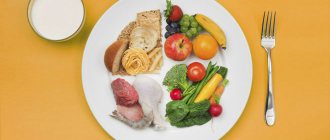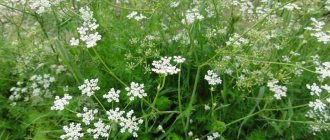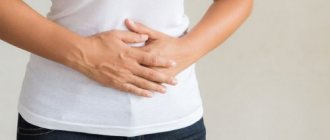The intestines play an important role in the digestion process. There are situations when, under the influence of various factors, pathological processes occur in this organ. Acute or chronic enteritis (diseases of the colon), or colitis (diseases of the small intestine) are interrelated, most often occur together and have a common name - enterocolitis.
With enterocolitis, the functionality of the intestine is disrupted, absorption and assimilation of nutrients worsens. If proper treatment is not started in time, such a condition can lead to vitamin, mineral or protein deficiency, metabolic disorders and exhaustion. Proper nutrition for intestinal diseases can help the body restore normal metabolism and restore the intestines to the lost functions of adequate digestion.
Main symptoms of intestinal diseases
With intestinal diseases, frequent bowel movements are observed.
Since the functions of the small and large intestines differ from each other (the small intestine is responsible for the absorption of nutrients into the blood, the large intestine is responsible for the production of vitamins, the processing of fiber, the formation of feces and their timely excretion), the symptoms will differ depending on the location of the disease.
Symptoms of colon diseases:
- Pain syndrome. Pain is more often observed in the lateral abdomen, less often in the epigastric region or above the navel. The pain has a dull, arching nature, which subsides after bowel movements or the release of gases.
- The stool is frequent, has a strong odor, and can sometimes contain mucus, blood, or have stripes resembling swamp mud.
- Rumbling, bloating, accumulation of gases. These symptoms intensify in the afternoon and weaken towards night.
- If discomfort occurs due to infection, the body temperature rises, headaches and dizziness appear.
Signs of inflammatory and tumor diseases of the colon are serious metabolic disorders. As a result, the patient feels weakness, exhaustion, the functions of the genital organs are impaired, and incontinence of gases and feces.
Colon cleansing methods
Fortrans is a medicinal substance intended for in-depth cleansing of the intestines in a short time. Often prescribed by doctors before diagnostic procedures. Used in preparation for intestinal operations. The drug is available in powder form. When using it, feces come out completely. The advantage of fortrans is the absence of spasms and painful sensations during cleansing. Does not affect human well-being. It should be taken with caution; the product exhibits a number of side effects indicated in the instructions for use. It is better to consult a qualified specialist before cleaning with Fortrans. There are also restrictions on the frequency of use of the drug.
Castor oil is the most common method for cleansing the intestines. Gained popularity due to its naturalness. Ideal for cleaning at home. The oil is used in getting rid of toxins, in the fight against constipation, and human parasites. It is worth considering that castor oil cleansing is not suitable for pregnant women, nursing mothers, or children under thirteen years of age. The action of the product is based on the high content of organic ricinoleic acid. Its molecules are considered the strongest intestinal irritants. As a result of the contraction of smooth muscles, peristalsis increases, and feces are evacuated out. This happens 4 hours after applying the oil. The dosage is calculated using the formula: body weight (kg) – number of drops. It cannot be exceeded.
Salt water cleaning is a common method. Ideal for people with bowel habits, when going to the toilet “in a big way” becomes difficult. And the following symptoms: gas formation appears 15-20 minutes after eating, inflammatory processes appear on the skin in the form of acne, blackheads as a result of intestinal malfunction. Colon cleansing with salt water is performed orally; an enema is not required. Salt can be chosen taking into account the individual characteristics of the body. Prohibited: cosmetic salt. It won't help, it will harm. The best option is sea salt. When cleansing with salt water, an additional positive effect will occur - metabolism will accelerate.
The procedure is carried out in the morning, after getting up. It's better to choose a day off. Prepare the solution: dissolve three teaspoons of the selected salt in a liter of water preheated to 50 degrees. The drink should be consumed within half an hour. For an unprepared body, in order to stop the urge to vomit, add lemon juice to the salt solution. The course is one month.
Magnesia – magnesium sulfate. A home assistant for removing harmful substances from the body. It is a tablet or powder preparation. You can buy it at a pharmacy without a prescription. Magnesium cleansing thoroughly rids the body of accumulated processed substances. This is due to the fact that the drug causes the muscles in the intestines to actively work. The method is useful. After treatment with magnesium sulfate, the condition of the skin, hair, and nails improves, psoriasis recedes, and the digestive tract functions properly. There are contraindications when using the drug. It is necessary to consult with your doctor.
Symptoms of diseases of the small intestine
- Pain in the navel area.
- Loose stools with a light color and a sour, unpleasant odor. Sometimes parts of undigested food are observed in the consistency of stool.
- Bloating, feeling of fullness.
- Temperature increase. Thermometer readings vary depending on the number of microbes and the degree of intoxication of the body.
With prolonged manifestations of such symptoms, pathologies of other organs and systems may develop (the skin becomes thin and dry, nails become brittle, joints become swollen and painful).
Objectives and principles of nutrition for a sick intestine
Diseases of the gastrointestinal tract occur due to poor nutrition.
Scientists have found that the occurrence of most diseases of the gastrointestinal tract is associated with regular violations of the diet.
Therefore, it is important to adhere to certain norms and rules of nutrition that will help restore the intestines to their previous functions.
Nutrition during the manifestation of diarrhea syndrome
Rice water will help with diarrhea.
Diarrhea is a symptom of an intestinal disorder that is accompanied by frequent loose stools.
With diarrhea, intestinal motility increases, and it stops absorbing fluid normally. Therefore, you need to eat foods that can reduce intestinal motility and restore its function to absorb fluid.
In the first days of diarrhea, attention must be paid to fluids. Drink plenty of warm water to help rehydrate your body. Healthy drinks include strong tea with lemon, apple juices, alkaline non-carbonated drinks, raisin and blueberry infusions.
On the second day it is allowed to eat crackers without flavoring additives and powders. You need to eat a small portion every hour and drink plenty of liquid. On the third day, you can gradually introduce foods that reduce intestinal motility and are most useful for diarrhea, namely:
- Rice water and liquid porridges. Rice does not contain fiber (which acts as a laxative) and has binding properties. It is recommended to eat one cup of rice water or porridge every 2 hours.
- Bananas. They replenish the body with potassium, which is washed out of the body during diarrhea. To do this, consume 2 bananas every 4 hours.
- Weak meat and chicken broths.
- Porridges that coat the gastric mucosa (semolina, oatmeal, buckwheat).
- White bread crackers.
- Baked or boiled apples (contain elements that bind toxins and restore beneficial intestinal microflora).
- Lean fish and lean meat (no skin, bones or fat).
- Boiled carrots and puree from them. Enriched with vitamin A, which improves the condition of weakened intestinal mucosa and has adsorbing properties.
- Fine-grained low-fat cottage cheese, boiled eggs or steamed omelettes will replenish the body with proteins.
- Vegetable soups and purees.
- Kissels and veins made from fruits and berries rich in vitamins.
Slag-free diet for 3 days
The first stage of standard preparation is changing the nature of your diet. The patient is recommended to eat only easily digestible refined foods. Therefore, 3 days before the study, it is mandatory to follow a slag-free diet.
| Can | It is forbidden |
| Eggs, cheese, sour cream, butter, yogurt and fermented milk products without additives or fillers | Vegetables in any form, including potatoes, herbs, mushrooms, seaweed. |
| Meat, poultry, lean fish (boiled, steamed or stewed) | All bakery, flour and pasta products |
| Sugar, honey (not in honeycombs) | Cereals, cereals, legumes, cereals, nuts, seeds, sesame, poppy seeds, grains, bran and other seeds, spices |
| Broths (clear, strained, tea, water, non-alcoholic, uncolored drinks. | Tough meat with cartilage, sausages, sausages, canned food, seafood |
| Allowed products and liquids must not contain small seeds, grains, seeds, bran | Fruits, berries, including dried fruits, preserves, jam, marmalade, jelly |
| Chips, hamburgers, chocolate | |
| Alcohol, carbonated drinks, coffee, compote, jelly |
The evening before the procedure and on the day of the examination itself, you should abstain completely from eating.
If the patient suffers from chronic constipation, then the diet should be started earlier (5-6 days before).
Prohibited foods for intestinal diseases
If you have an intestinal disease, consuming dairy products is prohibited.
The daily menu for a sick intestine should not include those foods that cause rotting and fermentation and contribute to gas formation.
Legumes and coarse plant fiber should be excluded. Vegetable fats are also not recommended, as they interfere with the absorption of nutrients.
Spices have an irritating effect on the digestive tract. Products that are prohibited:
- Fatty meats and fish;
- Legumes;
- Dairy products;
- Nuts;
- Spices;
- Fried eggs;
- Very salty foods;
- Fried and smoked dishes;
- Canned food;
- Sweet dishes;
- Mushrooms;
- Coffee;
- Caviar;
- Alcoholic and carbonated drinks;
- Fast foods.
Frequency of colon cleansing
The intestine is a huge organ of the digestive tract. Its role for a person is unusually great. It is necessary to carefully care for the organ. Cleaning is an unpleasant procedure, but useful. Doctors and nutritionists recommend resorting to the procedure every season: winter, spring, summer, autumn. Minimum – once every six months. You should not get carried away with cleaning and enemas.
The intestines are a microuniverse, the habitat of billions of beneficial lactobacilli. Bacteria help digest food, break down nutrients into microelements, and create the basis of immunity. Lactobacilli are washed out during cleansing procedures. If they are carried out at too short intervals, there will be unacceptably few bacteria left. We need to give them time to recover. One piece of advice regarding the frequency of bowel cleansing
